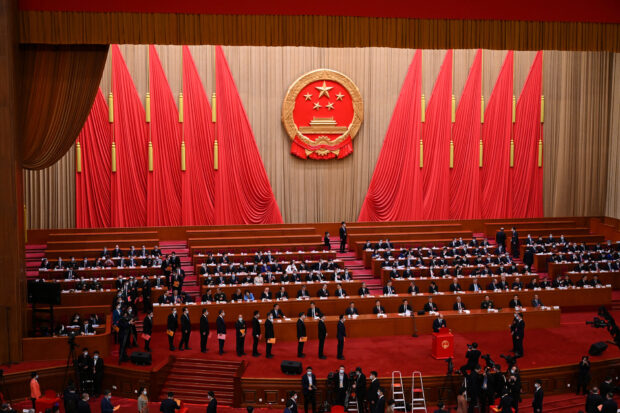
A general view of the fourth plenary session of the National People’s Congress (NPC) at the Great Hall of the People in Beijing on March 11, 2023. GREG BAKER/Pool via REUTERS
BEIJING — China’s parliament on Sunday approved the cabinet line-up nominated by Premier Li Qiang, who took office on Saturday in a once-in-five years reshuffle.
Also during the National People’s Congress (NPC), Xi Jinping was confirmed for a third five-year term as president.
Here are other key personnel moves made during the NPC, which closes on Monday.
China’s four new vice premiers:
Ding Xuexiang, 60, is the first-ranked vice premier who also sits in the ruling Communist Party’s Politburo Standing Committee, China’s top echelon of power. He is a trusted acolyte of Xi, and was Xi’s chief of staff first in 2006 in Shanghai and for the past 10 years in Beijing.
He Lifeng, 68, replaces Liu He as the next economic tsar. He is a long-time ally of Xi and was formerly in charge of the National Development and Reform Commission (NDRC), the powerful state planning agency.
Zhang Guoqing, 58, has a PhD in economics and spent 20 years working in defense corporations before turning to politics and holding top positions in the provincial-level cities of Chongqing and Tianjin, as well as in Liaoning province.
Liu Guozhong, 60, was formerly Communist Party chief of Shaanxi province, where Xi has ancestral roots.
China’s five new state councillors, who rank below the vice premiers but above cabinet ministers:
Li Shangfu, 65, also becomes the defence minister. He had worked in China’s satellite program and is under U.S. sanctions over the purchase of combat aircraft and equipment from Russia’s main arms exporter, Rosoboronexport.
Wang Xiaohong, 65, also holds the post of public security minister, or police chief. He is considered a close ally of Xi, having worked as a police chief in the city of Fuzhou when Xi was party chief there in the early 1990s.
Wu Zhenglong, 58, is secretary-general of the state council and was formerly party chief of Jiangsu province.
Shen Yiqin, 63,becomes the highest-ranking woman in China. Observers were surprised when the Communist Party broke with tradition and did not appoint any woman to its 24-member Politburo in October.
For the first time in decades there were no female vice premiers as well. Shen, the former party chief of Guizhou province, is the only female state councillor.
Qin Gang, 57, is also the foreign minister. The former ambassador to the United States had worked closely with Xi when he was chief protocol officer between 2014 and 2018.
The only cabinet-level personnel changes were at the NDRC and the defence ministry.
The following cabinet ministers held on to their positions:
Yi Gang, 65, unexpectedly stays on as governor of the People’s Bank of China. Yi, appointed as PBOC governor in 2018, had widely been expected to retire after being left off the ruling Communist Party’s Central Committee during the party’s once-in-five-years congress in October.
Zheng Shanjie, 61, takes over from He Lifeng as head of the National Development and Reform Commission. Zheng has spent most of his career in his native Fujian province where he had served as director of Fujian Provincial Development and Reform Commission and vice governor of Fujian province.
Liu Kun, 66, remains as minister of finance, another surprise since he is past the usual retirement age of 65.
Wang Wentao, 58, stays on as minister of commerce. He had served as governor of Heilongjiang province and was once Xi’s colleague in Shanghai.
Jin Zhuanglong, 59, stays on as minister of industry and information technology.
Wang Zhigang, 65, remains minister of science and technology.
Huai Jinpeng, 60, remains minister of education
Pan Yue, 62, remains head of the National Ethnic Affairs Commission
Wang Xiaohong, 65, remains minister of public security
Chen Yixin, 63, remains minister of state security. Considered a Xi ally, he had worked with Xi when the latter was party chief of Zhejiang province from 2002-2007. Chen was sent to the central city of Wuhan in 2020 to help lead anti-COVID efforts and in recent years led to purge corrupt security and legal officials.
Tang Dengjie, 63, remains minister of civil affairs
He Rong, 60, remains minister of justice
Wang Xiaoping, 59, remains minister of human resources and social security
Wang Guanghua, 59, remains minister of natural resources
Huang Runqiu, 59, remains minister of ecology and environment
Ni Hong, 60, remains minister of housing and urban-rural development
Li Xiaopeng, 63, remains minister of transport
Li Guoying, 63, remains minister of water resources
Tang Renjian, 60, remains minister of agriculture and rural affairs
Hu Heping, 60, remains minister of culture and tourism
Ma Xiaowei, 63, remains head of the National Health Commission
Pei Jinjia, 59, remains minister of veterans affairs
Wang Xiangxi, 60, remains minister of emergency management
Hou Kai, 60, remains auditor-general of the National Audit Office
RELATED STORIES